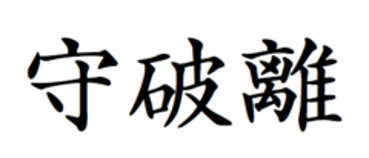As organisations increasingly deal with the volatility, uncertainty, complexity and/or ambiguity caused be disruptive forces with the rise of cloud solutions, IoT (Internet of Things), Artificial intelligence (AI), 5G mobile internet and Voice-driven software. It’s important for organisations to adopt a culture of learning and continuous improvement, thinking about how to become more economical, efficient and/or effective in the use of its people, practices and processes.
Continuous improvement is a behaviour that is synonymous with all the Agile frameworks. It forms the basis of the fail fast, adapt and repeat concept that enables organisations to deliver customer value early and often.
Shu-Ha-Ri is a Japanese martial art concept which describes the stages of learning to mastery. Martin Flower simply describes the idea that a person passes through three stages of gaining knowledge and wisdom. The same equally applies to organisations continually dealing with transformational change.
These stages are:
-
 Shu: In this beginning stage the student follows the teachings of one master precisely. They concentrate on how to do the task, without worrying too much about the underlying theory. If there are multiple variations on how to do the task, they concentrate on just the one way the master teaches them.
Shu: In this beginning stage the student follows the teachings of one master precisely. They concentrate on how to do the task, without worrying too much about the underlying theory. If there are multiple variations on how to do the task, they concentrate on just the one way the master teaches them. -
Ha: At this point the student begins to branch out. With the basic practices working, they now start to learn the underlying principles and theory behind the technique. They also start learning from other masters and integrate those learnings into their practices.
-
Ri: Now the student isn't learning from other people, but from their own practice and experience. They create their own approaches and adapts what has been learned into their own particular circumstances.
The way organisations can benefit from Shu-Ha-Ri is by everyone across the organisation following an established business practice or procedure to enable consistency, then understanding the underlying strategies and policies and finally challenging those existing business practices or procedures to minimise non value added waste.
In Lean, waste is any activity that consumes resources (i.e. people, assets, materials, funding and services) but brings little to no value to the customer. This waste can originate from transportation, inventory, motion, waiting, over production, over processing and underutilised talent. When following a business practice or procedure, it’s always important to continually determine whether an action transforms a product or service in a way that is valuable for the consumer.
An important part of ShuHaRi is organisational learning, which should involve reflecting on previous experience as well as capturing and actioning any lessons, and using this reflection and knowledge as a basis for both action and for critical questioning to avoid the same mistakes or failures reoccurring. The capacity of an organisation to be open and confident enough to encourage a culture of critical self-reflection and dialogue is intrinsically linked to organisational success and agility. These should not be confined to formal structures and approaches, because learning happens both formally and informally.
Working harder without process improvement is like trying to keep a leaky boat afloat by rowing faster. So how can organisations continually improve if they fail to act upon previous experience? Modern Agile by Joshua Kerievsky promotes an interesting principle whereby organisations should "Make safety a prerequisite". What this principle states is that "safety is both a basic human need and a key to unlocking high performance. [Organisations] actively make safety a prerequisite by establishing safety before engaging in any hazardous or [unknown] work. [Organisations strive to] protect people’s time, information, reputation, money, health and relationships. And [organisations] endeavour to make [their] collaborations, products and services resilient and safe."
In summation, the successful adoption of a Shu-Ha-Ri mindset across the entire organisation requires a culture where it’s safe to fail and where previous experiences are actively captured and acted upon rather than simply documented in a report for senior management approval. Organisations can only plan ahead when insufficient time is spent analysing how well they have done in the past. While Shu-Ha-Ri may be simply a way of thinking about how a person learns a technique, organisations can benefit where previous organisational learning is applied in dealing with transformational change.





